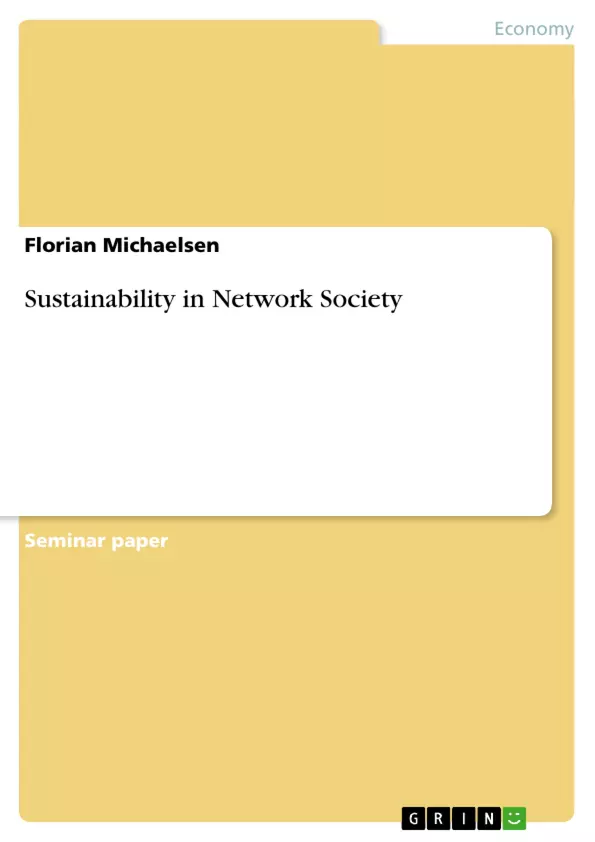In a process of creative destruction -as Schumpeter called it- new Enterprises rise and are destroyed permanently on and around the economic battlefield Internet. The economic impact of web based applications and services offered by enterprises all over the world changes not only our business environment, but our society at the grass-root level. In the 1990s supported by enduring growth and prosperity many marketers supposed changing rules for these new ways of doing business. Employees influence is eroding due to the fact that companies all over the world are measured by shareholder value. Today, after the turnaround and probably overleaped the low point of recession we can assume that the important drivers of measuring business success has not been changed. Revenue and profit is still the goal and judgement criteria of success. But what about environment? Why should the success of any business in the future be measured in growth and not for instance in terms of environmental compatibility. In a world of growing world population, emerging economies and millions of people ambitious to gain western living standards we can not longer afford ongoing economic growth but satisfying living conditions for all mankind. So why business success should not be measured in the attainment of specific environmental goals to sustain the basis of our own existence. In this context the social and human value and norms have to and are changing. So the changing rules are not done by business or due to the emerging internet technologies but to a change in society which is fostered by technological revolution. In this matter we will have a closer look at the concept of sustainability. How could this concept be adopted by the evolving Network Society? What are the threats and the chances for our life, nature and future? In this paper I will try to describe, analyse and conclude the major driving forces concerning sustainability in Network Society. I will start with descriptions of the status quo in research about sustainability and societal change, before analysing the most important actors and concluding what impact those simultaneous processes have on environmental concerns. The Conclusions should offer the reader a specific tendency, into which direction the Network Society will lead us concerning environmental tasks, problems and solutions.
Inhaltsverzeichnis (Table of Contents)
- Introduction
- Evolution of Sustainability
- Network Society; a brief overview.
- Fostering Sustainable Development
- Internet Deployment and Usage
- Non Governmental Organisations
- Formation of a New Environmental Consciousness..
- Hindering Sustainable Development
- Lack of Control....
- Unimpeded exhausted cultivation........
- eEnterprise.
- Conclusions..
Zielsetzung und Themenschwerpunkte (Objectives and Key Themes)
This paper aims to explore the concept of sustainability within the context of the evolving Network Society. It examines the challenges and opportunities presented by this societal transformation in relation to environmental concerns. The paper analyzes key actors driving sustainable development and evaluates their impact on the environment.
- Sustainability and the Network Society
- Environmental Impact of Internet Technologies
- Drivers and Hindrances to Sustainable Development
- Role of Non-Governmental Organisations (NGOs)
- Emerging Environmental Consciousness
Zusammenfassung der Kapitel (Chapter Summaries)
- Introduction: This chapter introduces the concept of sustainability within the context of the evolving Network Society, highlighting the impact of internet-based technologies on society and business. It emphasizes the need for a shift in measuring business success from economic growth to environmental compatibility, particularly in light of global population growth and aspirations for Western living standards.
- Evolution of Sustainability: This chapter traces the development of the sustainability concept, focusing on the Brundtland Commission Report and its emphasis on balancing economic growth with environmental protection. It discusses the concept of sustainable development and the need for conserving natural resources and promoting efficient resource utilization.
- Network Society; a brief overview.: This chapter provides a brief overview of the Network Society, discussing its key characteristics and the impact of information and communication technologies on society. It examines the role of the internet and social media in shaping social interactions and global communication.
- Fostering Sustainable Development: This chapter explores factors that contribute to sustainable development within the Network Society, including the role of internet deployment and usage, Non-Governmental Organisations (NGOs), and the formation of a new environmental consciousness.
- Hindering Sustainable Development: This chapter examines factors that hinder sustainable development in the Network Society, focusing on issues like lack of control and the unsustainable consumption patterns associated with economic growth.
- eEnterprise: This chapter explores the role of eEnterprise in promoting or hindering sustainable development, discussing the potential for businesses to adopt sustainable practices and contribute to environmental conservation.
Schlüsselwörter (Keywords)
The paper focuses on key topics such as sustainability, Network Society, internet technologies, environmental impact, sustainable development, non-governmental organizations, environmental consciousness, economic growth, resource consumption, and eEnterprise.
Frequently Asked Questions
What is the relationship between sustainability and the Network Society?
The paper explores how the evolving Network Society, driven by internet technologies, can foster or hinder environmental goals and sustainable development.
How should business success be measured in the future according to this paper?
The author suggests shifting from purely economic growth and revenue to environmental compatibility and the attainment of specific sustainability goals.
What are the main drivers of sustainable development in the digital age?
Key drivers include internet deployment, the active role of Non-Governmental Organisations (NGOs), and the formation of a new global environmental consciousness.
What hinders sustainability in the Network Society?
Challenges include a lack of control over global economic forces and unimpeded, unsustainable resource consumption patterns.
What is the role of "eEnterprise" in environmental issues?
The paper analyzes how web-based businesses change the economic environment and whether they can adopt practices that sustain the basis of our existence.
- Arbeit zitieren
- Florian Michaelsen (Autor:in), 2004, Sustainability in Network Society, München, GRIN Verlag, https://www.grin.com/document/38595



